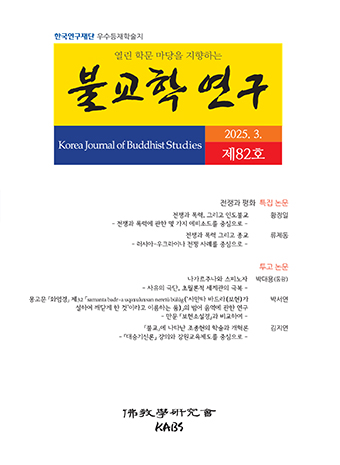Abstract
References
Sorry, not available.
Click the PDF button.
Information
The theory of sudden enlightenment(頓悟說) was first proposed by Dao-sheng(道生), who is also remembered for asserting the doctrine of Buddha-nature(佛性論). Dao-sheng’ s theory represents a uniquely Chinese appropriation of Buddhist enlightenment. It’s sudden character derives from the fact that the principle of truth(理) to which one is enlightened is the single ultimate(一極). Dao-sheng’s theory of sudden enlightenment is based on the assumption that enlightenment can only be realized in its entirety. The theory of sudden enlightenment is well demonstrated by Xie, Ling-yun’s(謝靈運) defense of Dao-sheng’s theory in his Bian-zong-lun(辯宗論), written in the early decades of the fifth century. After that, Dao-sheng’s introduction of sudden enlightenment gave rise to discussions on enlightenment between the ideas of sudden and gradual enlightenment. Moreover, Dao-sheng’s theory of enlightenment deeply influenced early Chan Buddhism.
道生은 般若學의 不二사상을 理不可分으로 해석하고, 이를 頓悟사상에 철저히 적용시킴으로써 돈오설의 이론적 측면을 다진 사상가로 평가된다. 그런데 도생이 돈오설의 주창자라고 해서 돈오만을 숭상하고 漸修를 완전히 배척하였던 것은 아니다. 이러한 頓漸겸비의 사상적 경향은 도생 혼자만의 특색은 아니며, 당시 小頓悟를 주장하였던 사상가들에게서도 발견된다. 다만 돈오의 단계를 七住에서부터 인정할 것인가, 十住에 이르러서야 진정한 돈오임을 인정할 것인가를 놓고 의견이 달라졌던 것이다. 이렇게 볼 때, 도생의 돈오설은 점수 이후의 돈오라고 할 수 있다. 도생은 이론적 측면으로 볼 때 十住 이전의 돈오에 대하여 철저히 부정하고 깨달음의 전면성을 강조하였다는 점에서 반야학의 신봉자라 할 수 있으며, 수행의 측면으로 볼 때 점수와 돈오의 겸비를 주장하여 어느 하나도 소홀히 여기지 않았다는 점에서 大乘 平等사상의 구현자라고 평가할 수 있을 것이다.
Click the PDF button.
- Publisher :Korean Association of Buddhist Studies
- Publisher(Ko) :불교학연구회
- Journal Title :Korean Journal of Buddhist Studies
- Journal Title(Ko) :불교학연구
- Volume : 29
- Pages :195 ~ 224


 Korean Journal of Buddhist Studies
Korean Journal of Buddhist Studies






